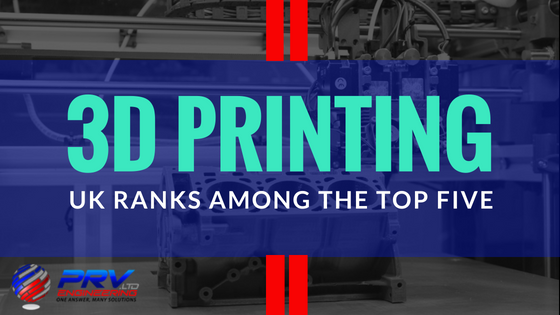
A new research study by A.T. Kearney and HP Inc has revealed some interesting data. The UK is placed fifth overall in adopting 3D printing and additive manufacturing behind the US, Germany, Korea and Japan. Within Europe, Britain came in second only behind Germany (placed second globally), and ahead of Sweden (eighth), France (ninth), and Italy at twelve.
According to HP Inc, Germany is the only European country with a more positive environment for the technology to transform manufacturing. Although we’ll see some positive data on 3D printing and additive manufacturing, it’s not all sunshine and roses.
3D Printing and the UK
The UK is set to improve even further as they’re rapidly expanding their 3D printing capabilities. According to the research, Britain is the world’s third fastest nation accelerating its domestic 3D printing market. Only South Korea and Italy, placed first and second respectively, are progressing faster. The positive statistics may be somewhat contradictory as early adopters and niche players are leading 3D printing in the UK.
If you’re wondering how Italy reached the top in terms of adopting the technology, it’s actually easy to explain. Businesses in Italy get significant tax breaks of 300-400% when investing in 3D printing technologies. Besides Italy and Germany, mainstream businesses in other European countries don’t seem to adopt the technology all that much. This could also explain why the UK is well-positioned in the 3D printing and additive manufacturing market.
3D Printing UK Market Challenges
In a meeting held on 4 June, arranged by the All Party Manufacturing Group at the House of Commons, barriers to adoption in the UK took center stage. Barry Sheerman, MP for Huddersfield, chaired the meeting arranged in association with HP.
Industry experts and academics revealed common perceived barriers which sound all too familiar.
- lack of skills and specialist training
- lack of government understanding
- an overly cautious investment attitude
- confusion about ROI among business owners
- splintered business support structure
3D specialist Graeme Bond, CEO of FDM Digital Solutions, praised the support at the MTC in Coventry and the AMRC in Sheffield. On the negative side, he believes there is a lack of communication about the incredible power of additive manufacturing to engineers on the production line. A broad consensus indicated that “showing rather than telling” is still the best way forward. Demonstrating to smaller companies the powerful ROI of 3D printing under the right circumstances is the smoking gun.
HP’s global VP for 3D Printing Strategy and Business Management, Alex Monino, agreed. He also added that the issue of government incentives, together with global agreement on quality and materials standards, was vital. Monino believes it will give the technology the stability it needs to bridge the gap between early adopters and mainstream adoption.
Opportunities For 3D Printing
In light of perceived barriers to the adoption of AM-3DP, the opportunities for the UK cover a wide range. According to the UK National Strategy for Additive Manufacturing, opportunities exist with less commonality than the perceived barriers.
Some opportunities are generic while others are more industry- or company specific. This, in particular, includes custom car or aerospace parts and spares along with sporting apparel. Stakeholders believe that the UK has the potential to build on strong existing capabilities and that there is an urgent need to ensure that such opportunities don’t go unnoticed.
The analysis help define the activities of the next stage in the strategy development process. However, 3D printing does not feature prominently in the Made Smarter Review which is a concern for many. This review is vital as it forms part of how manufacturing contributes to the government’s industrial strategy. Barry Sheerman promised to make the case in Parliament for AM-3DP to receive the attention it needs.
For more information, read the full AT Kearney/HP report and the UK National Strategy for Additive Manufacturing.
PRV Engineering manufacture for a variety of industries including construction, automotive, aerospace, defence, rail and steel fabrication among others. Get in touch with our team of experts if you need assistance with your engineering project. Share your comments in the section below or find us on social media and use the hashtag, #PRVTech.
This site uses Akismet to reduce spam. Learn how your comment data is processed.


 Mail:
Mail: 




Leave a Comments